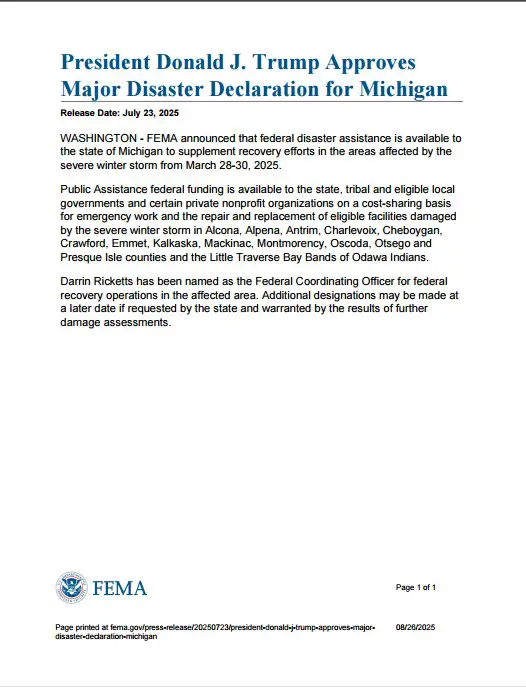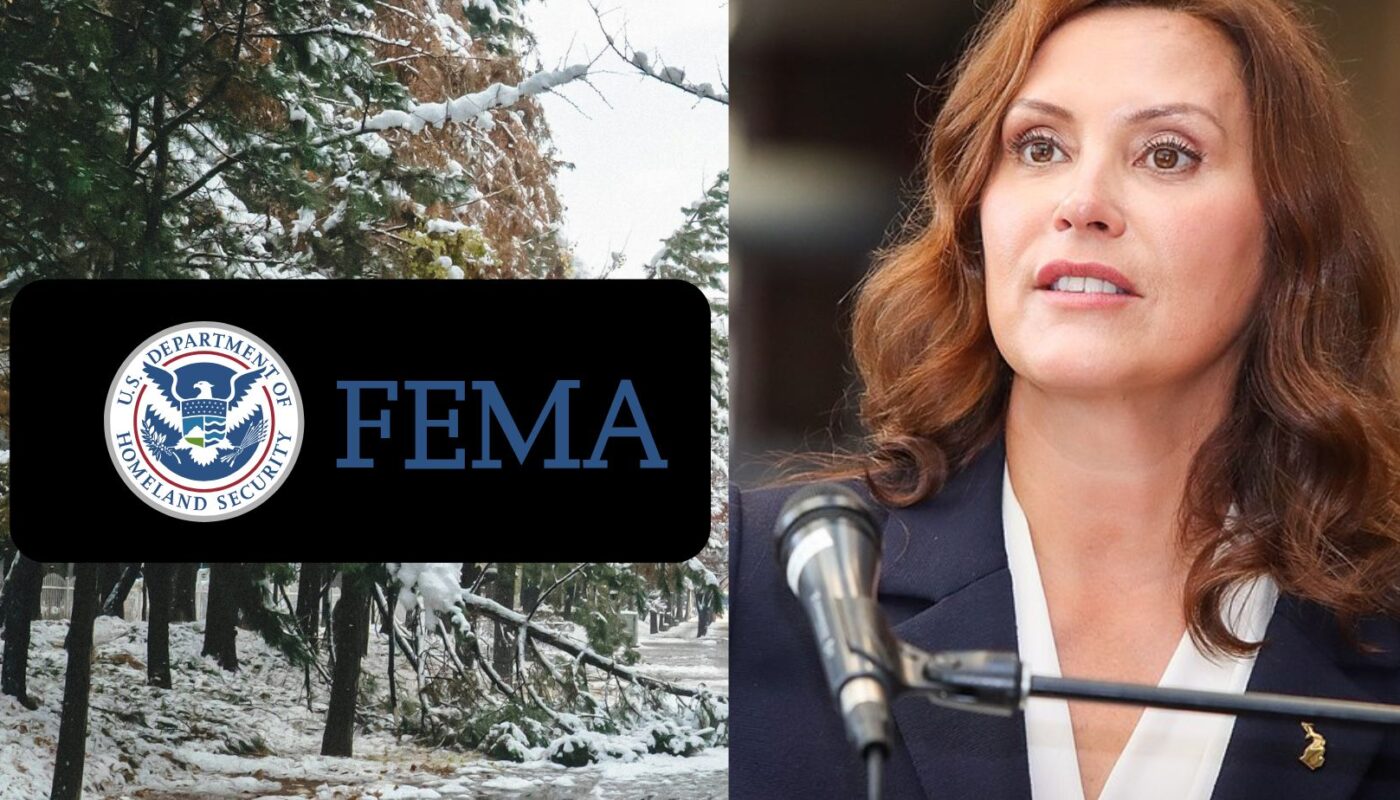Governor Whitmer escalates challenge to FEMA disaster aid rejection
In a press release issued yesterday, Governor Gretchen Whitmer has formally appealed critical denials by the Federal Emergency Management Agency (FEMA) of disaster aid programs essential to Northern Michigan’s post-ice-storm recovery efforts, arguing that residents, businesses, and utility providers remain stranded without key support. The appeal centers on FEMA’s refusal to authorize PA Category F, Individual Assistance (IA), and Hazard Mitigation Grant Program (HMGP) funding—all vital to long-term rebuilding.
March 2025 ice storm left lasting scars across Northern Michigan

The March 28–30 ice storm left Northern Michigan in disrepair, trapping communities under crushing ice, knocking out power, and paralyzing infrastructure. Widespread outages persisted for days and, in some areas, weeks; hundreds of thousands were affected statewide.
On July 22, 2025, President Donald J. Trump declared a federal disaster, enabling FEMA to assist local municipalities across 13 affected counties and the Little Traverse Bay Bands of Odawa Indians with emergency operations and limited permanent repairs. However, FEMA excluded utility sector recovery, housing support for individuals, and hazard-mitigation projects from its grant approvals.

Michigan leaders unite across party lines to press FEMA
Governor Whitmer emphasized that “Michigan families and businesses deserve the support they need to recover from these storms. That’s why I’m appealing FEMA’s disaster aid denials. I’ll keep fighting like hell to deliver relief for our residents, local governments and utility providers.”
Lieutenant Governor Garlin Gilchrist II, U.S. Senators Gary Peters and Elissa Slotkin, Congressman Jack Bergman, and State Senator John Damoose all voiced support—stressing that households, local economies, and co-ops like Presque Isle Electric & Gas (PIE&G) should not bear the full burden of recovery.
Electric cooperatives face staggering repair bills without FEMA
PIE&G, serving more than 35,000 members, reported catastrophic infrastructure damage: over 2,800 utility poles, 900 transformers, and 3,800 miles of power lines destroyed; nearly all substations knocked offline; 400,000+ hours of labor; and recovery costs soaring to $150 million—115 times costlier than any previous storm in its history.
A flat $20 monthly emergency recovery fee billed to member meters began in June to offset interest on a $100 million Emergency Line of Credit that PIE&G secured to pay for recovery efforts. Without FEMA’s Category F assistance, members could ultimately pay approximately $4,500 per household.
Great Lakes Energy (GLE), another rural cooperative covering northern and western Michigan, estimated recovery costs exceeding $155 million. As a nonprofit, GLE cannot tap investors, meaning all costs must be passed through to member billing. Rate increases are anticipated for years to address restoration, debris removal, depreciation, and loan interest.
How Whitmer appeals FEMA will determine fate of long-term recovery
The appeal must be submitted within 30 days, during which Michigan will present updated impact data to FEMA to justify the need for the denied programs—IA funding for displaced and impacted families, utility repair support under Category F, and long-term risk mitigation.
Experts on disaster recovery caution that denying hazard mitigation and utility recovery funds holds long-term costs. Investing in mitigation now can lower future rebuilding needs and protect infrastructure before the next disaster. Public utility officials and emergency managers have documented that proactive investments prevent spiraling consequences.
No verified source found.
Michigan communities brace for higher costs if FEMA aid fails
For Michigan residents and business owners, the stakes are immediate. Without these programs, financial burdens could translate into unaffordable utility bills, deferred system improvements, and a slower rebound from the storm.
Related developments suggest momentum: in July, Whitmer secured a presidential declaration authorizing Public Assistance for local governments, and she continues to press for broader aid eligibility.
Recovery efforts remain ongoing statewide. Dedicated websites and emergency response units, including the Michigan State Police Emergency Management and Homeland Security Division, continue coordinating aid and public outreach.
Read More Interesting Feature Stories From ThumbWind
- Michigan Feature News Stories – Unveiling the diverse and vibrant people, captivating places, and remarkable events that come together to make the Great Lake State unique.
- Strange Political News – A sarcastic take on official news from around the U.S., exploring the absurdities that often arise in the political landscape while providing a humorous perspective on current events and highlighting the quirks of politicians and policies.
- Michigan Hometown News – News and events from Michigan’s Upper Thumb region worth knowing, including local stories, impactful interviews, and updates on community happenings that shape the culture and lifestyle of the area.
Your Turn – Like This, or Hate it – We Want To Hear From You
Please offer an insightful and thoughtful comment. We review each response. Follow us to have other feature stories fill up your email box, or check us out at ThumbWind News




